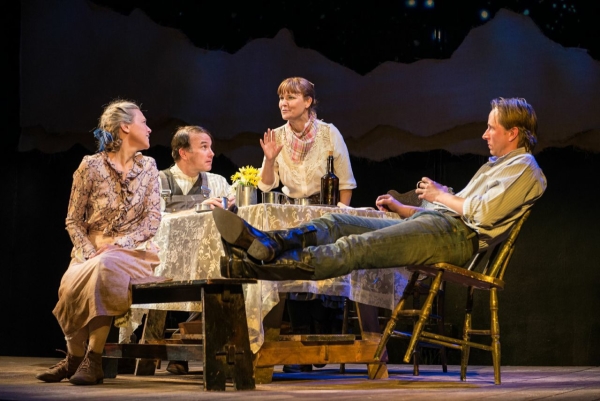Abundance
The Actors Company Theatre rediscovers Beth Henley’s 1990 play about two mail-order brides in the American frontier.

(© Marielle Solan Photography)
The bonds of sisterhood are tested over the course of 25 years in Abundance, a largely forgotten Beth Henley play from 1990 only now receiving its first major New York revival courtesy of the Actors Company Theatre (TACT). In a production as skilled as Jenn Thompson's at the Beckett Theatre, you can't help but wonder why this play so unjustly fell through the cracks. This major rediscovery of a key work by one of America's great writers does the piece a whole lot of justice.
At the time it premiered at Manhattan Theatre Club, Abundance was a departure for Henley, who had won a Pulitzer for her drama Crimes of the Heart and focused her writing largely on the inner machinations of large families in the contemporary American South. Abundance, on the other hand, is no facsimile of her older stories. Set between the 1860s and 1890s, it follows the friendship of two unrelated women in the American West, specifically Wyoming and Missouri.
Those two women, Bess Johnson (Tracy Middendorf) and Macon Hill (Kelly McAndrew) are a pair of mail-order brides from the East Coast, would-be companions to lonely men who headed west presumably following the Gold Rush, and found themselves seeking companionship via advertisements in newspapers. As the play begins, Bess has been waiting several days for Michael, a sensitive figure who wrote her many letters and loves to sing. She and Macon meet serendipitously; Macon, more tomboyish than the delicate Bess, is also awaiting her suitor, a one-eyed widower named Will Curtis (Ted Koch).
Bess' husband never does show up; instead, it's his brother, Jack Flan (Todd Lawson), who arrives bearing the news of Michael's recent death. While Jack, cantankerous and prone to fits of violence, couldn't be more different than what Bess imagined his brother to be, she goes with him anyway. In the ensuing years, Bess and Macon's friendship grows as Jack treats her worse and worse. Following a particularly disturbing first-act closer, Henley creates a chilling second half, where fortunes are reversed as the decades pass and our heroines morph into figures that we barely recognize.
In the hands of Thompson and her skilled actors, the years fly by in a blink, sneaking up on us through small revelations. It's particularly noticeable in Middendorf's breathtaking performance, with a growth from a naive hick into a scarred world-weary woman is an acting feat both in physical and verbal language. McAndrew is similarly accomplished; her character's downward mobility through age and time is quite astonishing. The menfolk, Lawson (frightening), Koch (sweet), and Jeff Talbott (as a fifth character whose presence is more or less a spoiler), are very much their equals.
Thompson's designers adroitly capture the sepia-toned milieu of the late 19th century. Wilson Chin provides a rustic set with a sliver of dusty sky, lit with a scorching desert atmosphere by Philip Rosenberg. Tracy Christensen's costumes are artfully bedraggled, while Toby Algya's honky-tonk musical score adds to the Western feel, giving the space an a real authenticity — no small accomplishment for a tiny auditorium on West 42nd Street.
How Abundance got lost in the sands of time is anyone's guess. It's a major disappointment that a piece with a wealth of wonderful roles, an equally superb script, and two unapologetically strong female characters would need to be rediscovered by anyone. Through its realization that Abundance is top-shelf Henley, TACT once again confirms its important place in the off-Broadway scene, giving us second looks at works that were unknowingly pushed aside.








